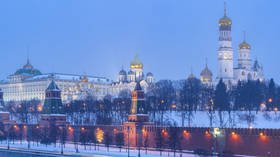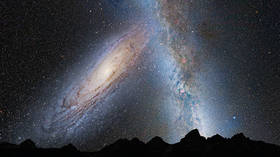Why are there so many snowflakes on the Western media Russia beat?

Few media specialties, or disciplines of Western academia, attract as many sensitive souls as Russia. Rather ironic given the country is constantly associated with “aggression” by the Anglo-American press.
A bit of mild criticism? That’s an unfollow. Offering a different point-of-view? That’s a block. Calling out sloppy fact-checking? That’s a block too. Welcome to the world of Western journalism and punditry on the Russia beat: a self-contained pit of rumor, fear, braggadocio, bullshit, and propaganda.
And quite often, extreme incompetence. Of the sort which would prompt a swift march to the exit door in most other professional spheres, but better whisper this in case it offends a few snowflakes*.
Let’s be clear, there’s a whole phalanx of folk watching what’s written on RT, and trying to find holes – ranging from EU funded (EuvsDisinfo etc.), US State supported (Polygraph, etc.) to billionaire backed (‘European Values’) – I'm even aware of a British University project wasting time, and money, tracking this network.
Thus, every time I place a word on this website I know full well people are literally getting a paycheck for trying to catch me out. And, more of that to them, if it’s what they want to do with their lives.
Now, fasten your seatbelt, because it’s rant time. And here’s the straw which splintered the camel’s hump. Earlier this week, Katja Yafimava (an energy expert whom I follow on Twitter), corrected a report by one Anna Smolchenko. She’s a correspondent at AFP, a French state-backed newswire.
Smolchenko had tweeted: “With great pomp and ceremony Putin and China's Xi launched a giant gas pipeline linking the countries for the first time but some analysts say the project makes no economic sense. None. It should not have been built, they say.”
With great pomp and ceremony Putin and China's Xi launched a giant gas pipeline linking the countries for the first time but some analysts say the project makes no economic sense. None. It should not have been built, they say @AFP storyhttps://t.co/EN40msj3aGpic.twitter.com/U66XADMs5W
— Anna Smolchenko (@Annaafp) December 2, 2019
Her linked article was about the new Power of Siberia (PoS) pipeline which directly connects China to the Russian gas network for the first time.
“Well, PoS will allow Russia to diversify its pipeline supply, previously all towards Europe, which is a sensible thing to do,” Yafimava countered. “As for economic rationale, no professional analyst would comment on it without knowing the price at which gas is sold and the formula is confidential.”
Katja knows her stuff, so I decided to read the piece. And I immediately noticed two things which weren’t kosher. First off, Smolchenko claimed Russia and China had spent $400 billion on the construction, making it about as expensive as the US interstate highway system which covered more than 47,000 miles (about 75,000km).
It is not what it says on yahoo finance. pic.twitter.com/YNNhWU44KJ
— nikola (@nikola_sock) December 3, 2019
This was complete nonsense. In reality, the $400 billion was the value of gas purchases.
What a gas
And there was another weird Smolchenko claim: “but some analysts have said the project makes little economic sense, given its enormous costs, and should not have been built.”
She offered a single name to back this up: Mikhail Krutikhin. He’s a Western media fixture who would find a way to make the discovery of a cure for cancer look like a bad thing if the Kremlin unveiled it tomorrow.
“Some analysts? There's one Russian analyst quoted: Krutikhin (who criticizes everything the Russian government does & is a fixture in the US/EU think tank racket). He doesn't give any reason/proof for his $100 billion estimate & his biases suggest he's an unreliable source,” I wrote to Smolchenko. In her piece, Krutikhin had estimated “the pipeline's cost at some $100 billion, nearly double the $55 billion price tag announced by Gazprom.”
“Dearest Bryan, why are you so aggressive?! There are other analysts who think/thought similarly. Just ask Sberbank :) Obviously, not every analyst could or should be cited,” she replied. “A lot of experts tiptoe around the issue or are simply afraid to comment and lose their job.”
Dearest Bryan, why are you so aggressive?! there are other analysts who think/thought similarly. Just ask Sberbank :) Obviously, not every analyst could or should be cited. A lot of experts tiptoe around the issue or are simply afraid to comment and lose their job
— Anna Smolchenko (@Annaafp) December 2, 2019
“Aggressive? Why do you think I’m aggressive? I’m pointing out that the piece mentions ‘some analysts’ but only cites one. Who produces a figure out of thin air,” was my next post. “Why (obviously!?!?) couldn’t another be referenced, especially when such a sweeping statement is made?”
At this point, Smolchenko (herself employed at a French state outlet) got personal, which is always the last refuge of the scoundrel. “Oh, a visiting lecturer in Journalism 101 from a Kremlin-funded TV channel? Good luck to you,” she tweeted. And then she blocked me.
Now, this might be normal enough behavior for a teenager perhaps arguing with a friend over whether Shawn Mendes or Zayn Malik is the better singer, and getting all emotional, but for a professional journalist, it's a bad look. The moment we press a key or pick up a pen, we are accountable to our readers. And if we make mistakes, we should own them.
In Mountebanking Shadows
Smolchenko is not alone. Last month, I was also blocked by Mark Galeotti – one of those ‘Russia Watcher’ chaps who pretends to know more about Russia than he does. He’s currently shaping young minds at UCL SSEES in London and lobbying for RUSI, a think tank funded by Britain’s largest weapons maker BAE Systems, while remaining a fixture in Western media where he pontificates on Russia.
“Up to now, my sense is that Russia has genuinely believed NATO's Article 5 guarantee of mutual protection to be rock-solid,” he tweeted.
Up to now, my sense is that #Russia has genuinely believed #NATO's Article 5 guarantee of mutual protection to be rock-solidI can't help but wonder whether Macron's recent comments may encourage them to reassess that, something that ought to worry both Russians & Europeans
— Mark Galeotti (@MarkGaleotti) November 8, 2019
“I can't help but wonder whether (Emmanuel) Macron’s recent comments (on NATO being “brain dead”) may encourage them to reassess that, something that ought to worry both Russians & Europeans.”
Now, I knew that was rubbish. “Aside from the fact Russians ARE Europeans, there’s long been doubt in Moscow about whether ‘Article 5’ was rock-solid, or would be applied equally. As anyone with good sources here knows, the Kremlin isn’t entirely convinced the US would really go to war for the Baltic states,” I replied. “Certainly its true to say the Kremlin regarded the NATO mutual defense commitment as ‘rock-solid’ for the likes of Germany or France but whether Washington would really risk nuclear war for countries most Americans wouldn’t be able to find on a map, or have never even heard of, well…”
Rather than engage, or simply ignore, Galeotti evidently couldn’t deal with being corrected (by someone with far more access to Russian elites than he has), so he blocked me. Incidentally, later the same day, I asked a Kremlin insider whether he thinks Galeotti has good Moscow sources, “Who would f**king talk to him,” came the reply. In English.
And, for context, this is the man who gave us the ‘Gerasimov Doctrine’. The biggest load of nonsense to emerge from ‘Russia Watching’ in this decade. And that is saying something.
Also on rt.com Like the ‘Gerasimov Doctrine’ it spawned, it’s time to retire the concept of ‘Russia Watching’What’s more, he’s got plenty of form for this sort of ‘snowflakery’. Earlier this year, he posted on Twitter about “dirty Russians” and was called out by the Russian journalist Yasha Levine. The latter asked him would he ‘tweet out ‘dirty Jews’ or ‘dirty Mexicans’ if you were on a panel about Jewish/Mexican gangsters?”
Galeotti replied “why not?” And then blocked Levine. A man who has forgotten more about Russia than he will ever know.
Bullshit, Mark. You’re telling me that you’d tweet out “dirty Jews” or “dirty Mexicans” if you were on a panel about Jewish/Mexican gangsters?
— Yasha Levine (@yashalevine) February 27, 2019
This week Galeotti retweeted a message which read “fascinating how Mark Galeotti actually understands Russia much better than many of the Russians.” The man offering praise claimed to be from Estonia and his avatar showed him dressed in a Santa hat, holding an axe.
Perhaps that’s the problem with the term “snowflake,” maybe it’s just a new word for touchy narcissists?
PS. *In case you’re unfamiliar with the very contemporary term “snowflake.” It’s defined on Wikipedia as “a person who is overly-emotional, easily offended, and unable to deal with opposing opinions.” And “someone hypersensitive to insult or offense,” over at Wiktionary.
The statements, views and opinions expressed in this column are solely those of the author and do not necessarily represent those of RT.















